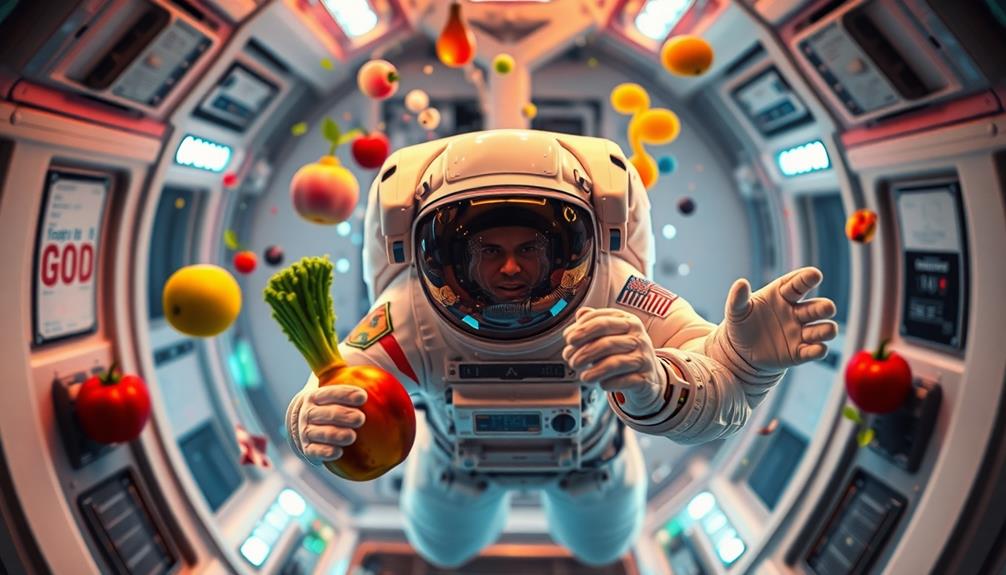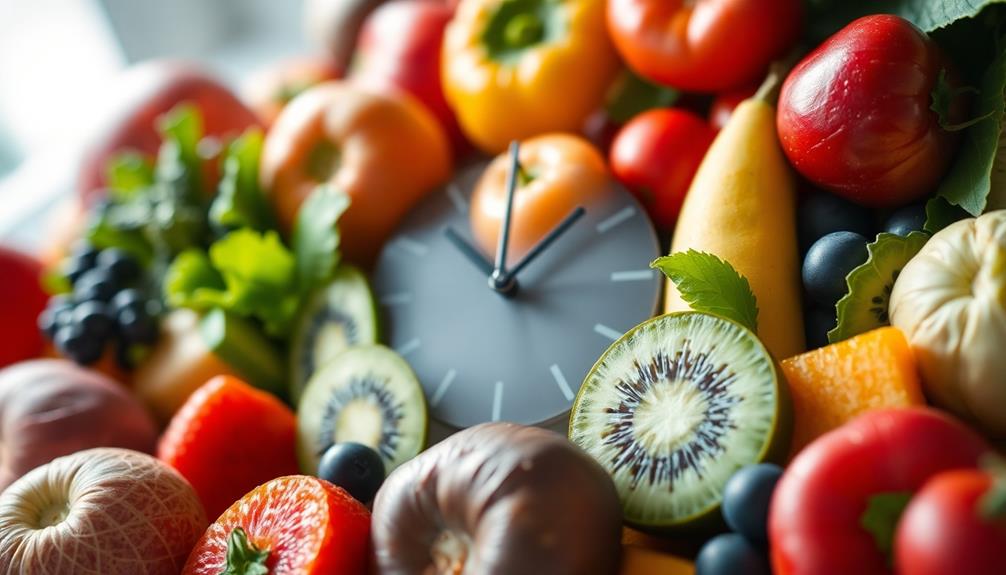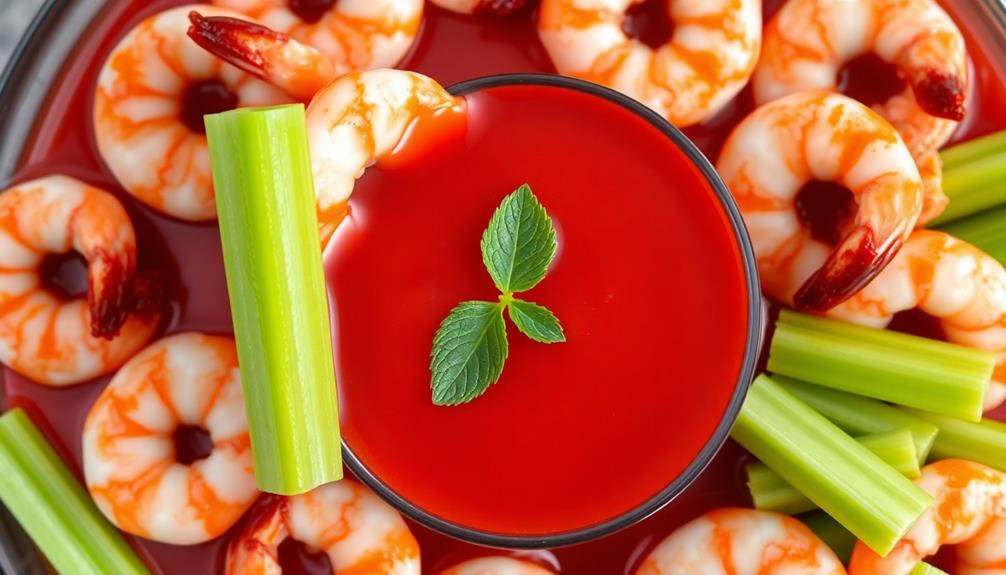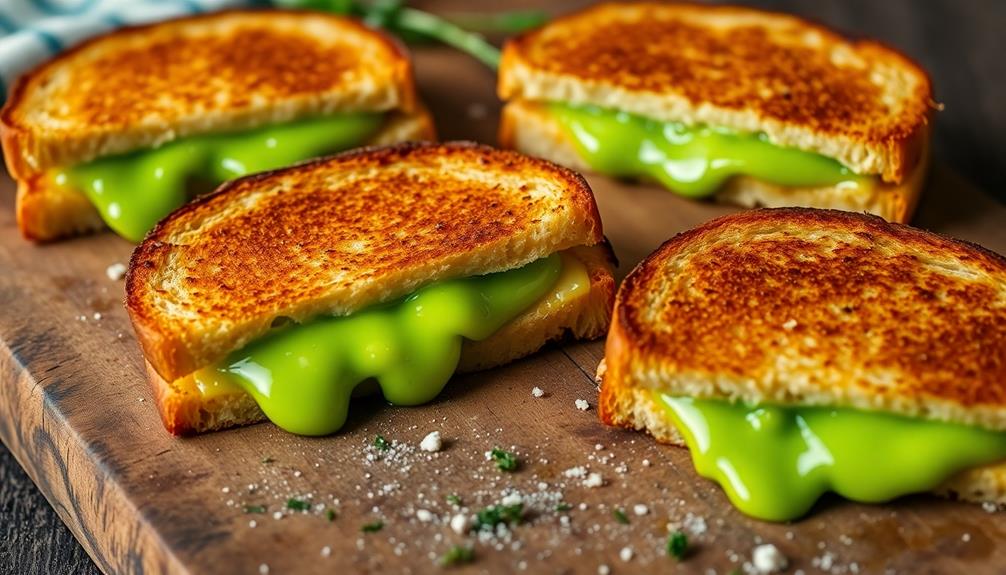Microgravity greatly changes how you perceive taste. In space, fluid shifts can congest your sinuses, reducing your ability to smell and making food seem bland. Although you can still detect basic tastes, overall flavor experiences are muted. Curiously, astronauts often crave stronger flavors like spicy dishes to enhance their meals. The lack of familiar environmental cues further complicates food enjoyment, driving the need for more intense flavors. Many adapt their diets to include bolder tastes and aromas. If you're curious about how this affects astronaut nutrition and meal design, there's more to discover about this fascinating topic.
Key Takeaways
- Microgravity causes fluid shifts that lead to sinus congestion, diminishing the sense of smell and overall flavor perception.
- Taste sensitivity decreases in space, resulting in muted flavors even when basic tastes remain detectable.
- Astronauts often crave stronger flavors, such as spicy dishes, to enhance their food experiences in microgravity.
- Familiar environmental cues are absent in space, which negatively impacts food enjoyment and meal enthusiasm.
- Incorporating stronger aromas into space meals is essential for improving flavor enjoyment and influencing astronaut morale.
Understanding Taste Perception

Taste perception is fundamentally linked to both taste buds and olfactory receptors, and you often don't realize how much they work together until one is impaired. Your taste buds detect fundamental flavors like sweetness, saltiness, and bitterness, while the interplay with fresh ingredients, such as those found in Farm-to-Table Cooking, can enhance the overall experience.
However, without the sense of smell, your overall flavor experience diminishes. When you eat, the aroma of the food plays a key role in how you perceive its taste, creating a rich tapestry of flavors. Without the sense of smell, you may struggle to identify subtle notes in the food, such as the difference between a ripe and unripe fruit. Additionally, the impact of air quality on flavor becomes more apparent, as pollutants in the air can affect the aroma of the food and therefore your perception of its taste. Overall, the sense of smell is crucial in fully experiencing and enjoying different foods and flavors. Therefore, it’s important to consider not only the taste and texture of food, but also the aroma that it gives off. The sense of smell enhances the overall dining experience, allowing you to fully appreciate the complexities of each dish. In fact, there are 6 ways air quality impacts food flavor, including the alteration of aroma compounds, the potential for contamination, and the influence of humidity and temperature on the perception of taste. It’s clear that air quality plays a significant role in our enjoyment of food, making it essential to consider when dining or cooking.
In microgravity, astronauts face unique challenges that disrupt this interaction. Bodily fluids shift toward the upper body, causing congestion that mimics a stuffy nose, greatly impairing the sense of smell.
As a result, even though they can still identify basic tastes, the enjoyment of food drops dramatically. Many astronauts report that meals taste bland, prompting them to seek stronger flavors. They often turn to spicy or umami-rich foods to enhance their meals, trying to compensate for the diminished sensory experience.
Understanding how taste buds and the sense of smell work together sheds light on why astronauts must adapt their eating habits in space, making flavor enhancement essential for their dining satisfaction.
Impact of Microgravity on Taste
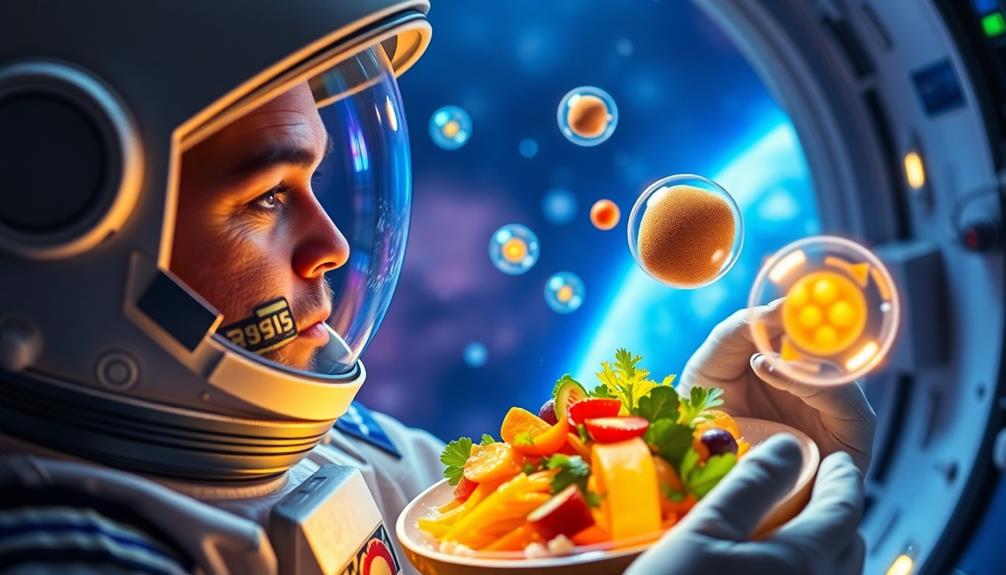
Microgravity's impact on taste perception can be profound, as astronauts experience significant changes in how they perceive flavors during space missions.
One major factor is fluid shifts in the body that lead to sinus congestion, reducing your ability to smell. This diminished sense can make foods seem bland and unappetizing, which is particularly concerning when considering the rich flavors of dishes like Red-Braised Pork Belly that rely on intense seasoning for enjoyment.
Research shows that while you can still detect fundamental tastes like sweetness, saltiness, and bitterness, the overall enjoyment of food is compromised. Astronauts often find themselves preferring stronger flavors, like spicy or seasoned dishes, to counteract their reduced taste sensitivity.
The unique environment of space can amplify the sense of confinement and stress, further impacting your appetite and enjoyment of meals.
In essence, the combination of altered taste perception and psychological factors creates a challenging eating experience for astronauts. Understanding these effects can help in designing better meal options for long-duration space missions, ensuring that astronauts maintain both their nutritional needs and enjoyment of food.
The Role of Aroma
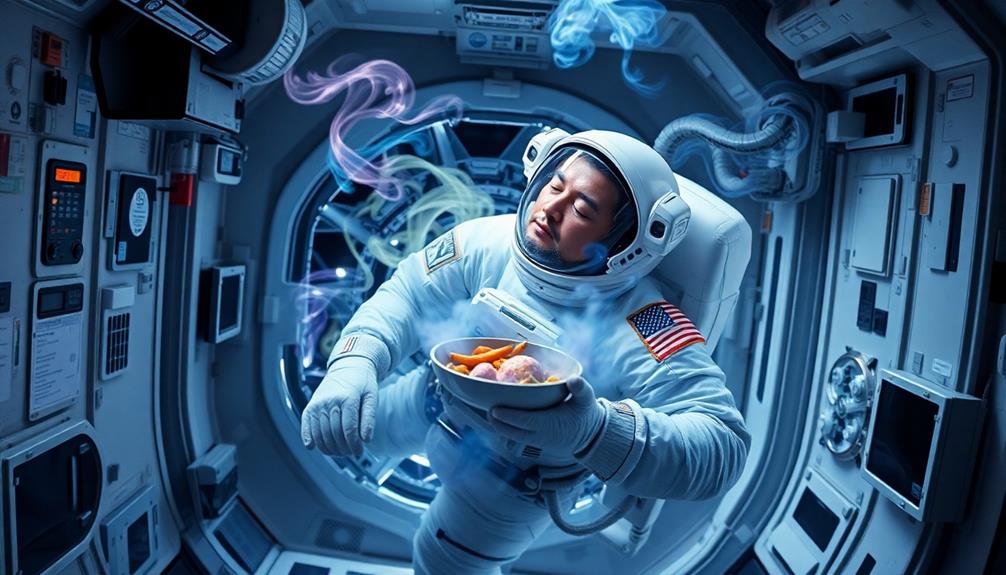
Aroma plays an essential role in how we experience flavor, making it especially important for astronauts in space. When you savor a meal, it's not just your taste buds at work; your sense of smell greatly enhances the overall flavor.
In a microgravity environment, however, the perception of aroma can change. Fluid shifts in your body lead to nasal congestion, which can dull your ability to detect certain scents. Notably, some traditional Thai desserts, like Khanom Tan, are known for their unique blend of sweetness and coconut aroma, which could be particularly enjoyable for astronauts.
Research shows that some sweet-smelling molecules, like vanilla and almond, are perceived more strongly in space. This could mean that astronauts might enjoy these flavors more while orbiting Earth.
Yet, not all aromas behave the same way. While lemon maintains a consistent aroma perception, others can vary, which highlights the importance of carefully selecting aromas when designing space meals.
Environmental Factors in Space
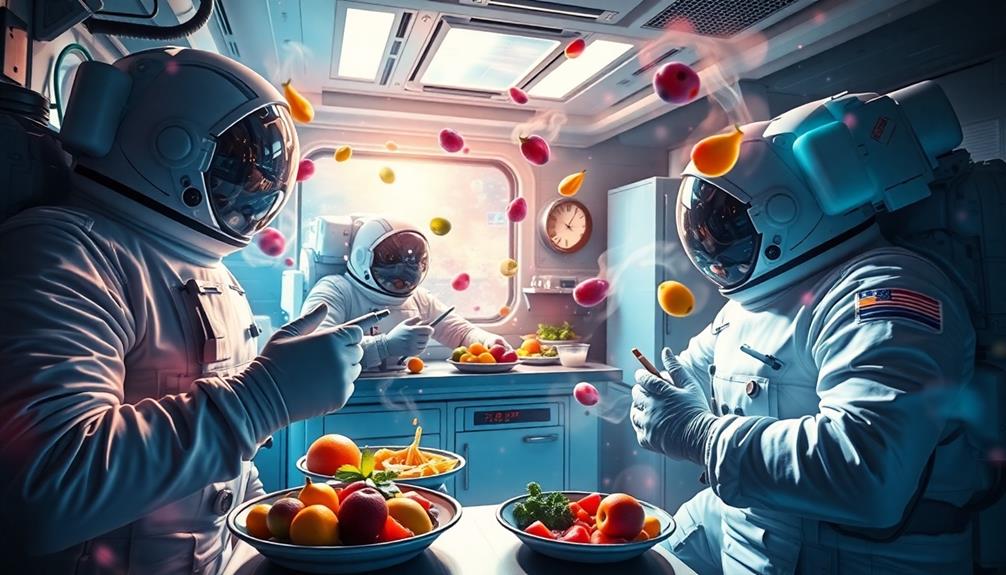
In the unique environment of space, a range of environmental factors greatly influences how astronauts experience food. One significant issue is the shift of bodily fluids towards the upper body, which mimics the symptoms of a stuffy nose. This congestion impairs your sense of smell, leading to an altered taste perception where food tastes bland.
In microgravity, the absence of familiar cues—like fresh air or varied surroundings—also changes how you perceive flavors, making meals less enjoyable than on Earth. Curiously, astronauts often find that they crave stronger flavors, similar to those found in dishes like Mushroom Masala, to compensate for their dulled taste sensations.
Additionally, the confined and isolated nature of spacecraft can create psychological stress that impacts your appetite and overall enjoyment of food during long missions. With fewer visual and auditory stimuli related to eating, your interest in meals can diminish.
Because of these factors, astronauts often find themselves craving stronger flavors or spicier foods to compensate for their dulled taste sensations. Consequently, space agencies adapt by providing highly seasoned meal options, aiming to enhance your dining experience in the challenging environment of space.
Understanding these environmental influences can help improve meal planning for future missions, ensuring that food remains a source of comfort and enjoyment.
Research Findings and Experiments
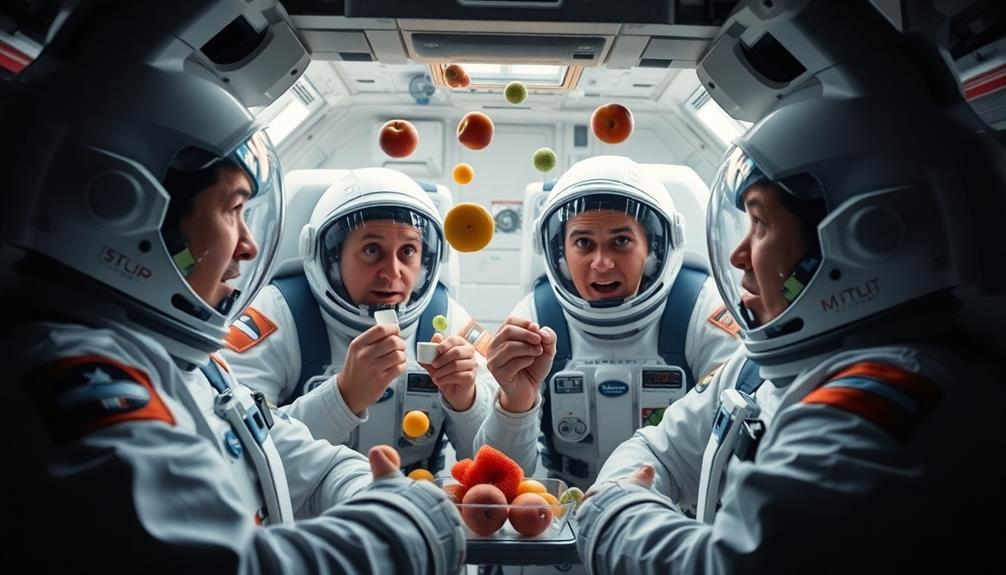
In microgravity, you might notice changes in your taste sensitivity, especially as nasal congestion affects your ability to smell.
Research shows that while you can still detect basic tastes, the overall flavor experience can feel muted, leading to a preference for stronger flavors.
This phenomenon parallels the way certain culinary traditions showcase bold flavors to enhance taste experiences.
Psychological factors also play a role, influencing how you perceive and enjoy food in space.
Taste Sensitivity Changes
Microgravity's impact on taste sensitivity is significant, and research reveals that astronauts often face a decline in their ability to taste while in space.
Studies show that the upward fluid shift in microgravity causes nasal congestion, mimicking a blocked nose. This leads to diminished olfactory function, which is essential for flavor perception.
Curiously, just as Brazilian cuisine often incorporates bold flavors to enhance dishes like Caldeirada, astronauts also favor stronger tastes. Although you can still detect fundamental tastes like sweetness, saltiness, and bitterness, the overall experience often tastes bland in space.
During various space missions, astronauts reported a marked preference for stronger flavors, particularly spicy foods. This preference arises because their taste sensitivity diminishes, making it harder to enjoy milder flavors.
To combat the blandness of their meals, astronauts often turn to flavor enhancers, such as hot sauces and umami-rich foods, to elevate their dining experience.
Research indicates that the combination of reduced smell and taste sensitivity creates a less satisfying culinary experience in space.
As a result, astronauts continuously adapt their diets to include bolder flavors, enhancing their meals while maneuvering through the unique challenges of microgravity.
Aroma Perception Variability
Aroma perception varies considerably in space, and recent research sheds light on how different scents affect astronauts. Studies show that certain sweet-smelling molecules, like vanilla and almond, are perceived more strongly in microgravity settings. This variance can greatly influence the enjoyment of food in space.
For instance, the rich flavors found in traditional dishes like Muamba De Galinha from Angola could be enhanced by stronger aroma perceptions, making meals more satisfying during long missions.
Here are some key findings:
- Sweet Aromas: Increased sensitivity to sweet-smelling compounds enhances the flavor profile of space meals.
- Lemon Consistency: Unlike other scents, lemon aroma perception remains stable across environments, suggesting some aromas are less affected by microgravity.
- Molecular Impact: The complex structure of aromas alters how your olfactory receptors respond, leading to unique taste experiences.
Understanding these differences in aroma perception can help improve the overall eating experience for astronauts during long missions.
By strategically incorporating stronger aromas into space food design, researchers aim to enhance flavor and make meals more enjoyable. This knowledge will be essential for future missions, where food enjoyment plays an important role in astronaut morale and well-being.
Embracing the science of aroma perception can lead to substantial improvements in how astronauts experience food in space.
Psychological Influences on Eating
Eating in space isn't just about the food itself; it's also influenced by the psychological environment surrounding astronauts. Confined environments create psychological stressors that can diminish your interest in food, ultimately affecting your appetite and taste perception.
As you spend more time in space, the novelty of eating in microgravity might wear off, leading to reduced enthusiasm for meals. Additionally, incorporating familiar flavors and textures, such as those found in traditional Italian dishes, can help stimulate the taste buds and enhance the eating experience.
Your emotional well-being plays an essential role in how you perceive flavors and enjoy your meals. Research shows that stress and isolation can greatly alter your sensory experience, causing decreased satisfaction with food.
In such an environment, your ability to smell may also be impacted, further complicating the enjoyment of what you're eating.
To maintain morale and guarantee you receive adequate nutrition during long missions, it's important to have varied and appealing meal options. By focusing on the psychological influences of eating, space agencies can help astronauts thrive, making sure that meals remain a source of joy rather than a chore.
Ultimately, understanding these psychological factors can improve the overall dining experience in space, making it critical for mission success.
Future of Space Nutrition

As space missions grow longer and more complex, the future of space nutrition becomes increasingly essential to astronaut well-being.
Research shows that diminished taste sensitivity in microgravity leads astronauts to crave stronger, spicier foods, similar to how dishes like Laksa can offer bold flavors and spices. This preference highlights the need to adapt food options for extended missions.
Here are three key areas to focus on for future space nutrition:
- Customized Diets: Understanding how microgravity affects taste perception allows for tailored meal plans that enhance flavor and satisfaction.
- Sustainable Food Sources: Successful growth of crops like red lettuce on the ISS paves the way for future space agriculture, supporting long-duration missions to Mars and beyond.
- Flavor Technology: Future food innovations will refine taste profiles, making meals more enjoyable for astronauts while also considering the health benefits of space-grown crops.
Frequently Asked Questions
How Does Microgravity Affect Taste?
Microgravity affects your taste by shifting bodily fluids, which can lead to sinus congestion and reduced smell. You might find flavors bland, prompting a preference for stronger tastes to enhance your eating experience in space.
What Does Zero Gravity Do to Your Taste Buds?
In zero gravity, your taste buds become like a dimmed light, struggling to shine. You'll find flavors muted, often craving stronger tastes to awaken your palate, much like a chef seeking bold spices in a bland dish.
Do Your Taste Buds Change in the Sky?
Yes, your taste buds do change in the sky. You might find flavors less intense, causing you to crave stronger tastes. Astronauts often add spices and condiments to enhance their meals during space missions.
How Does Microgravity Effect Food?
When you're floating like a spaceship cowboy, microgravity alters food's flavor. You might find dishes taste bland due to reduced smell, pushing you to crave bolder flavors to satisfy your palate in space.
Conclusion
In microgravity, your taste buds might not work the way they do on Earth. Studies show that astronauts can lose up to 30% of their taste sensitivity while in space, turning even your favorite meals into bland experiences. This shift highlights the importance of aroma, as scents can greatly enhance flavor perception. As space missions advance, understanding these changes is essential for developing effective space nutrition strategies, ensuring you enjoy every bite, even in the cosmos.
